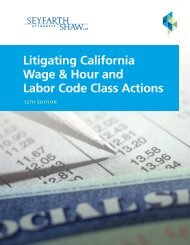Massachusetts Employment & Labor Law Report - Seyfarth Shaw LLP
Massachusetts Employment & Labor Law Report - Seyfarth Shaw LLP
Massachusetts Employment & Labor Law Report - Seyfarth Shaw LLP
You also want an ePaper? Increase the reach of your titles
YUMPU automatically turns print PDFs into web optimized ePapers that Google loves.
web development and interface software. The Sheriff’s<br />
Department considered a number of applicants for each<br />
position, including two white applicants who were younger<br />
than the plaintiff. The application process involved several<br />
stages, including a panel interview and an examination that<br />
tested the applicants’ IT knowledge. Although the plaintiff<br />
was allowed to complete all stages of the application<br />
process, she scored considerably lower than the two white<br />
applicants at both the interview and the examination stages.<br />
As a result, the Sheriff’s Department hired the two white<br />
applicants rather than the plaintiff.<br />
The plaintiff filed a lawsuit alleging unlawful discrimination<br />
based on her gender, race, age, and national origin in<br />
violation of <strong>Massachusetts</strong> General <strong>Law</strong>s ch. 151B, Title VII<br />
of the Civil Rights Act of 1964, 42 U.S.C. § 2000e, and the<br />
Age Discrimination in <strong>Employment</strong> Act, 29 U.S.C. § 623. The<br />
District Court granted the Sheriff’s Department’s motion for<br />
summary judgment, holding that the plaintiff had failed to<br />
sustain her prima facie burden because she had not shown<br />
that she was qualified for either of the positions or similarly<br />
situated to the applicants hired. The District Court also<br />
noted that the Sheriff’s Department had demonstrated a<br />
nondiscriminatory justification for its decision and that the<br />
plaintiff had not shown this reason to be pretextual.<br />
On appeal, the plaintiff argued that by allowing her to<br />
advance through the interview process, the Sheriff’s<br />
Department had effectively admitted that she was both<br />
qualified for the positions and similarly situated to the<br />
applicants hired. The First Circuit reviewed the evidence<br />
concerning plaintiff’s IT background and experience and<br />
interview/examination scores, as well as the other applicants’<br />
work experience, IT background, and interview/examination<br />
scores. The First Circuit dismissed the notion that the<br />
Sheriff’s Department had conceded plaintiff’s qualifications<br />
simply by allowing her to advance through the hiring<br />
process: “That the [Sheriff’s Department] in an abundance of<br />
caution let her application advance does not make Goncalves<br />
qualified.” It similarly found that the decision to allow the<br />
plaintiff to advance in the hiring process was insufficient<br />
to create a genuine dispute of material fact regarding the<br />
similarly situated element of her prima facie case, noting<br />
that it could not “rely on ‘overly attenuated inferences,<br />
unsupported conclusions, and rank speculation’ to quiet the<br />
tolling of the summary judgment bell.”<br />
While Goncalves serves to protect employers who may<br />
provide opportunities to under-qualified applicants to<br />
proceed through the interview process, employers should<br />
do so with caution, keeping in mind the First Circuit’s<br />
statement that it was “confusing” as to why the Sheriff’s<br />
Department had permitted the plaintiff to proceed if she<br />
clearly lacked the requisite skills and experience. In another<br />
set of circumstances, a plaintiff may successfully argue that<br />
resolution of this “confusion” should be left to a jury.<br />
First Circuit Finds<br />
Banquet Sales Managers<br />
Exempt from Overtime<br />
The First Circuit recently held that sales managers for a<br />
Boston banquet facility are exempt from the overtime<br />
requirements of the FLSA and <strong>Massachusetts</strong> wage laws<br />
because they qualify as administrative employees.<br />
In Hines v. State Room, Inc., the plaintiffs sought unpaid<br />
overtime wages that they claimed they were due. The<br />
banquet facility countered that the plaintiffs were exempt<br />
from the FLSA’s overtime requirements because they were<br />
administrative employees. The plaintiffs responded by<br />
claiming that their job duties – which included securing<br />
wedding and other event business for the company and<br />
working with clients to design those events – did not meet<br />
the criteria for the administrative exemption. The plaintiffs<br />
argued, first, that the sales aspects of their job made them<br />
“production” workers not eligible for the exemption, and,<br />
second, that they did not exercise the level of independent<br />
judgment and discretion required for the exemption. The<br />
District Court rejected both of these arguments, and the First<br />
Circuit affirmed.<br />
The First Circuit determined that the plaintiffs’ job duties<br />
could not be considered “production” because they were<br />
ancillary to the employer’s principal business function<br />
of actually providing banquet services. The Court also<br />
found that the job involved the exercise of independent<br />
judgment and discretion because acting as the face of the<br />
company and “engaging potential clients and assisting<br />
them in selecting from various options from the employers’<br />
offerings” required “invention, imagination and talent.”<br />
The Court rejected the plaintiffs’ assertion that, based<br />
on language in a recent and controversial decision by the<br />
Second Circuit involving pharmaceutical sales representatives,<br />
In re Novartis Wage & Hour Litigation, they could not be<br />
exempt under the administrative exemption because they<br />
lacked authority to make financial decisions and did not<br />
perform any of the job duties listed in the DOL administrative<br />
exemption regulations. The First Circuit rejected the notion<br />
that “simple evaluation of the regulation’s exemplary list of<br />
factors to be considered among ‘all the facts involved in the<br />
particular employment situation in which the question arises’<br />
<strong>Seyfarth</strong> <strong>Shaw</strong> — <strong>Massachusetts</strong> <strong>Employment</strong> & <strong>Labor</strong> <strong>Law</strong> <strong>Report</strong> - December 2011
















